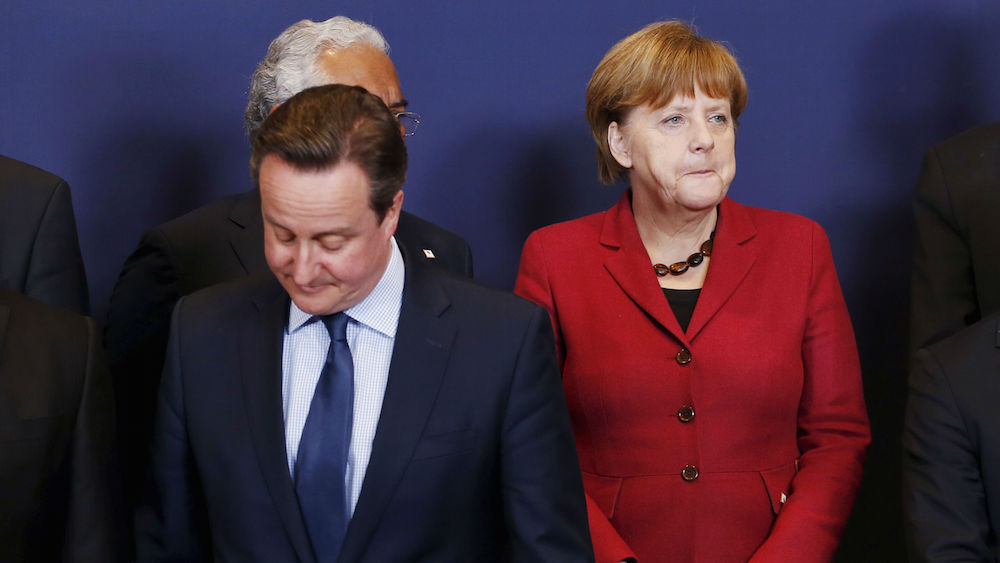Berlin has awoken to the new reality of a European Union without Britain. The German political world was caught off-guard by Britain’s Leave vote – but while some are calling it the “greatest catastrophe in the history of European integration,” others see it as an opportunity.
“Damn! Ein schlechter Tag für Europa” (“A bad day for Europe”). Sigmar Gabriel, Germany’s vice chancellor and economics minister, resorted to profanity when he took to Twitter to express his feelings at the news that the British, by a narrow margin, had voted to leave the European Union.
Damn! Ein schlechter Tag für Europa. #EUref
— Sigmar Gabriel (@sigmargabriel) 24. Juni 2016
At lunchtime, a somewhat shaken Chancellor Angela Merkel read out a prepared statement in the Chancellery, calling the British “no” vote a “turning-point for Europe and European integration.” She urged the remaining 27 EU members not to make any rash decisions, but to calmly consider the Union’s future course and arrive at “the right decisions” to carry the EU forward together.
“The EU is strong enough,” Merkel emphasized, while reminding listeners of the origins of European integration as a post-war peace project. The consequences of Britain leaving would only become apparent in the next “days, weeks, months, and years.” However, reforms are needed to enable the EU to demonstrate “how it improves the lives of EU citizens.”
Earlier, Foreign Minister Frank-Walter Steinmeier had reacted diplomatically: “The early morning news from Great Britain are [sic] truly sobering. It looks like a sad day for Europe and the United Kingdom,” he tweeted, before inviting his colleagues from France, Italy, and the Benelux countries – the EU’s founding members – to an emergency meeting to Berlin on Saturday. Steinmeier’s and Gabriel’s Social Democrat (SPD) party, the junior partner in Merkel’s coalition government, called for the German Bundestag to hold an extraordinary session to discuss the news, which will take place on Tuesday.
All of Germany’s parties were in shock on Friday morning. Norbert Röttgen, a member of Angela Merkel’s CDU party and chairman of the Bundestag Foreign Affairs Committee, called Brexit “the greatest catastrophe in the history of European integration.” Dietmar Bartsch of the Left Party told Die Welt newspaper: “It is shocking that the shrill slogans of the Brexit supporters have become acceptable to a majority of people.”
“Out means out. It will be as in a real-life divorce,” said Elmar Brok, the CDU chairman of the European Parliament’s Foreign Affairs committee. “The British people will find out soon enough what that really means.”
Speaking at an event at the German Council on Foreign Relations (DGAP), Brok stressed that “we need to keep calm and see how we can come to a civilized relationship”; however, if the Swiss or Norwegian model is not acceptable – neither country is a member of the EU, but both are part of the European Single Market, which means that they subscribe to its principles, including free movement of labor, which Brexit supporters want to end – the United Kingdom “may end up with an association and partnership agreement not unlike what the EU has with Ukraine.”
However, mixing frustration (“I’m angry now, but anger is a bad counsel”) with hope, Brok pointed to the fact that Britain’s younger generation overwhelmingly voted for staying in the EU. “It’s important to keep the door open, too.” In any case, the EU now needs “to show that it can deliver,” with France, Germany, Italy, and Poland to take the lead.
Germany’s media were equally shattered. “A political earthquake in Europe” was the headline on Die Welt’s website. SPIEGEL magazine, which in an earlier edition had reached out to Britons (“Please Don’t Go”), called it “the big bang.” Frankfurter Allgemeine Zeitung (FAZ) suggested that the British vote hinted at a problem that concerned not only the UK, but all of the Western world, pointing to the growing popularity of right-wing populist movements across Europe and the success of US presidential candidate Donald Trump.
Across Europe, right-wing populist indeed had a field day. Marine le Pen, leader of the right-wing Front National in France, tweeted “Victory” in capital letters, and Geert Wilders, leader of the anti-immigration Dutch Party for Freedom in the Netherlands, declared it would now be “our turn”. However, the president of the European Parliament, Martin Schulz, told German television network ZDF that the Brexit would “not lead to a chain reaction” across Europe, and the British example would not encourage other countries to “take this dangerous path.”
NB. This post was updated to include the statement by Chancellor Angela Merkel.







